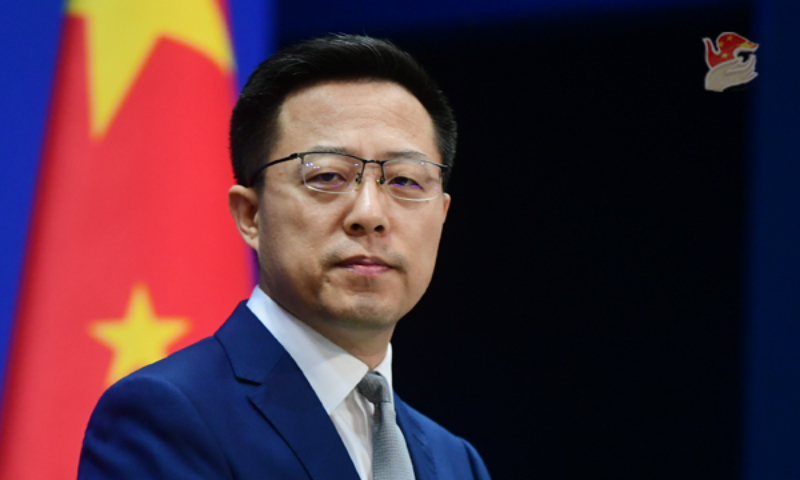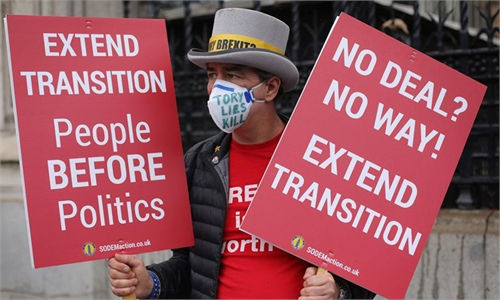UK's accusing of China 'assaulting' BBC journalist a serious distortion of the facts: FM spokesperson

Zhao Lijian, spokesperson for the Chinese Foreign Ministry Photo: fmprc.gov.cn
In response to UK prime minister Rishi Sunak's accusation of a BBC journalist "being assaulted" in China, a spokesperson from China's Ministry of Foreign Affairs rebuked that remarks from the UK as a serious distortion of the facts and said the remarks constitute grave interference in China's internal affairs, and that China is firmly against this.
In his first foreign policy speech on Monday, Sunak criticized China's handling of the zero-COVID policy — including "assaulting" BBC journalist Ed Lawrence — and said China posed "a systemic challenge to our values and interests."
In response, ministry spokesperson Zhao Lijian said during a Tuesday briefing that on the night of November 27, to maintain public order, local police in Shanghai asked people who had gathered at a crossroads to leave. One of those at the scene is a resident journalist from the BBC. Though the police made it clear to the journalist and others that they needed to leave, the journalist refused to leave and during the entire time did not identify himself as a journalist.
The police then took him away from the scene. After verifying his identity and informing him of pertinent laws and regulations, the police let go of him. Everything was conducted within legal procedures. This BBC journalist refused to cooperate with the police's law enforcement efforts and then acted as if he were a victim. The BBC immediately twisted the story and massively propagated the narrative that its journalist had been "arrested" and "beaten" by police while he was working, simply to try to paint China as the guilty party. This deliberate distortion of truth is all too familiar as part of the BBC's distasteful playbook, said Zhao.
Zhao said that while having the right to report news in accordance with the law in China, foreign journalists need to consciously follow Chinese laws and regulations. When conducting reporting and interviews, journalists need to present their press credentials first, and they should not engage in activities incompatible with their capacity as journalists.
This applies to all media organizations and is not about freedom of the press. Many foreign media organizations have presence in China. How come the BBC is always involved in troubles at the scene? This is a question that requires some serious thinking, he asked.
Zhao also raised some questions for the UK.
First, how does the British government handle domestic protesters, Zhao asked, saying that in 2020, the UK police arrested more than 150 people when Londoners took to the street to protest against COVID lockdown. In 2021, the UK police arrested more than 200 people in large-scale demonstrations triggered by the government's public expenditure cuts. Publicly available videos show that UK police officers ruthlessly kicked and beat one unarmed protester and did not stop even when the protester was left exposed in little clothing and was crying and begging for mercy.
Second, how does the British government treat journalists? Zhao pointed out that a few years ago, a Chinese journalist was repeatedly hampered and even physically assaulted and eventually convicted by a British court, only because she had exercised her legitimate right as a journalist and raised a question to express her opinions at a fringe event of the Conservative Party's conference. Graham Phillips, a UK journalist, became the first British citizen placed on the country's sanctions list, only because he had created media content not to the liking of the West.
Third, how does the BBC report China, he asked? From applying a gloomy filter to painting China in a negative light to distorted reports on Xinjiang and Hong Kong, many people still remember well the BBC's disreputable history of smearing and attacking China. Since 2019, the BBC has been ignoring the Hong Kong rioters' violent behavior and accusing Hong Kong police of brutality. On Xinjiang, based only on several non-photorealistic satellite images and reports written by anti-China elements, BBC journalists stationed in Beijing propagated "lies of the century" to slander Xinjiang. On the COVID pandemic, the BBC even used a counter-terrorism drill video as "proof" of the so-called China's violence in epidemic prevention. Why did the BBC always show up on those scenes? Is the job of BBC journalists to report news or fabricate news?
The UK must respect facts, act prudently, and end its hypocritical practice of double standards, said Zhao.
China's ambassador to the UK has been summoned to the Foreign Office amid a diplomatic row over the incident involving the BBC journalist, Bloomberg reported on Tuesday, citing a UK government source.
Chinese Ambassador to Britain Zheng Zeguang said that the UK side is now falsely claiming that the journalist had been "arrested" and "beaten" by Chinese police. Such a groundless accusation is a distortion of the truth and malicious slander and is totally unacceptable to the Chinese side.
Foreign journalists have the right to report news in China, but they need to follow Chinese laws and regulations while doing their work. When reporting and interviewing, journalists need to present their press credentials first and not engage in activities incompatible with their capacity as journalists, said Zheng.
This applies to all media organizations and has nothing to do with the question of freedom of the press. The UK should enhance its education of journalists sent to China by UK media outlets, require them to follow local laws and regulations and journalism ethics and not engage in activities incompatible with their capacity as journalists. The UK side must respect facts, be prudent in what it says or does and stop its practice of double standards, said the ambassador.

